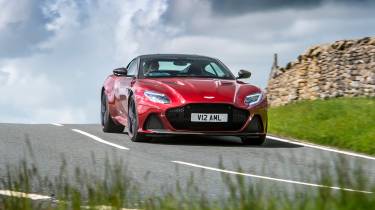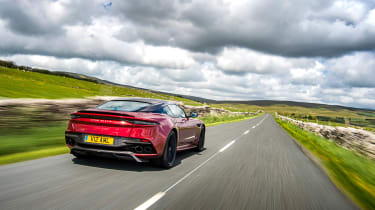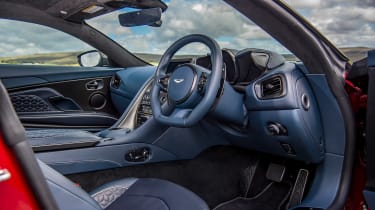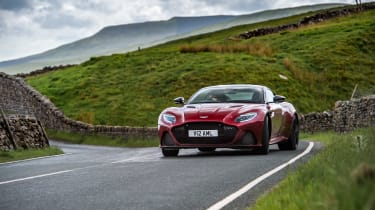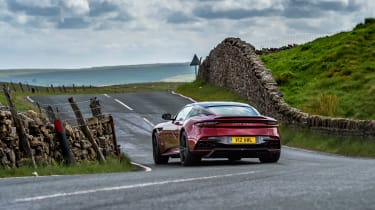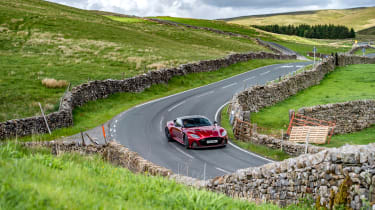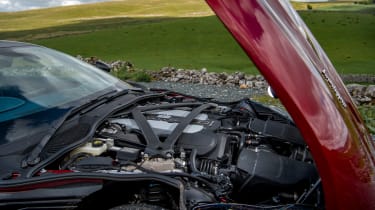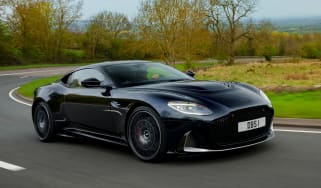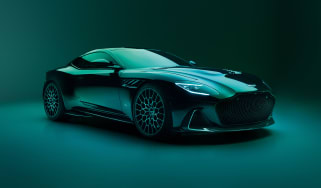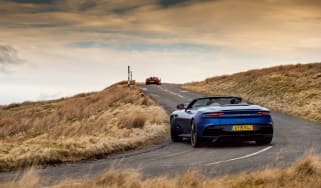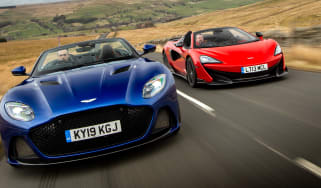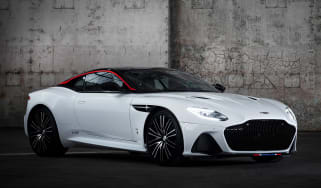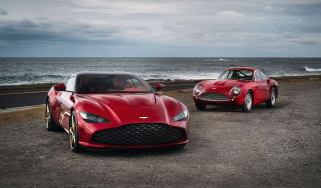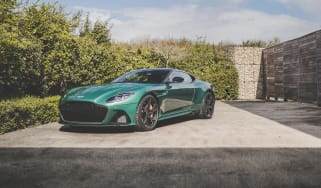Aston Martin DBS (2018 - 2024) review – end of the line for Aston's brawny super GT
Crushing performance paired with impressive long-distance comfort and an old-world GT charm. It’s Aston at its best
With a new breed of Aston Martin on the horizon, the V12-engined DBS is on the verge of extinction. We'll be happy to leave behind some elements of Aston's flagship GT car – namely its hopeless HMI system and dated interior – but others will be sorely missed. The DBS is unashamedly old school, hugely characterful and sometimes intimidating, just as a 715bhp rear-wheel drive Aston should be.
With a circa-£257,000 base price it has more than a few traditional supercars to contend with, but the Aston does things in its own way, bridging the gap between supercar and GT with a wider bandwidth that’s helped create a niche of its own. And with the sharper, even more ferocious DBS 770 Ultimate edition being built to mark the end of production, the DBS is going out with a 759bhp bang.
> Aston Martin Vanquish 2024 review - Britain’s Ferrari 12 Cilindri rival
Available as both a coupe and convertible, the DBS – and the sold-out £314k Ultimate 770 in particular – sits at the apex of a range that now includes the DB12, which provides a first taste of the next generation of Aston Martin. But does the firm's flagship super-GT still have appeal in its twilight years?
The DBS's 5.2-litre twin-turbocharged V12 is derived from the old DB11, and hoicking it up to its higher state of tune hasn't required an extensive mechanical overhaul. With just a tickle of the ECU, the DBS generates a faintly absurd 715bhp and with 664lb ft of torque. One change that was deemed necessary was a stronger gearbox to cope with such outputs, hence the adoption of a beefier eight-speed torque converter from ZF.
More reviews
The DBS posts some very impressive numbers for a big front-engined coupe. It takes just 3.4sec to get from zero to 62mph, while a clearer illustration of its potency can be gained from the zero to 100mph time of just 6.4sec. Flat out, the DBS can hit 211mph, so be in no doubt, it’s a seriously fast car.
Yet while there’s not much new to talk about with the engine, there’s plenty of noteworthy news elsewhere. The DBS uses carbonfibre panels over its aluminium structure, which the company says contributes to a 72kg weight saving over a DB11 V12. Curiously, Aston Martin has removed the old Superleggera element of its moniker, it was perhaps unwise to interpret the old ‘superlight’ name in a literal sense: quoted as ‘from’ 1693kg ‘dry’ – the DBS is far from a light car.
Those expensive carbon panels are formed into an undeniably aggressive shape, but one that also manipulates the air to create 180kg of downforce at the car’s top speed, thanks to a fixed rear lip, working rear diffuser and careful airflow management along the car’s flanks. Under the skin, the chassis sits 5mm lower than a DB11, with the Skyhook adaptive damping retuned to suit the DBS’s more sporting role, and with new suspension geometry and bushing characteristics. In terms of overall set-up, it sits in a similar range to the new DB12, which is markedly more taut and aggressive than the DB11 before it.
The new ’box runs a shorter final drive ratio over that of the DB11 to prioritise acceleration, and there’s a mechanical limited-slip differential with torque vectoring to help deploy the torque on offer. Braking is via massive 410mm/360mm (front/rear) carbon-ceramic discs with six- and four-pot calipers respectively, while 21-inch rims are shod with 265/35 and 305/30 Pirelli P Zero tyres of bespoke construction.
There’s a temptation to take one look at the Aston Martin DBS Superleggera and compare it with that other gargantuan front-engined supercar, the Ferrari 812 Superfast. Happily for Aston Martin, the DBS is something quite different; for all its wildly slashed bodywork, gaping air intakes and dramatic proportions, this is very much a GT car – one that majors on readily accessible and almost endless reserves of performance, yet still combines them with comfort.
It’s a big car, and always feels it from the low-slung driving position, with the extremities mainly hidden from view. Tackling British B-roads sometimes elicits a large intake of breath, but the car’s inherent agility means you soon get used to placing the car exactly where you need it on the road. That V12 has a significant presence, whether on start-up or pulling hard through the mid-range, and only at higher rpms does it lack the quality of tone possessed by its naturally aspirated older relations. In fact, the first impression of driving the DBS is how easy it all is, from the surprisingly supple ride – only occasionally do the low-profile tyres protest over a bad surface – to the seamless shifts of the auto ’box and the light and very quick steering. But the potency of the V12 is readily apparent, because even a small application of throttle is enough to surge past slower-moving traffic; the DBS is a hilariously effortless overtaker.
There are three familiar modes for the engine and ’box, and also a further three for the Skyhook adaptive suspension. Switching out of GT into Sport provides a keener throttle response, and a lot more noise from the exhaust, and while the car’s softish ride is a positive in normal driving, you’ll soon crave greater body control when the pace is upped.
Like all the modern-era Astons, the DBS features a quick steering rack that does take a little getting used to, but its accuracy and natural weighting are both plus points, and the DBS certainly shrugs off its mass well.
When pressing on, the rear of the car feels notably soft, presumably to aid traction, but the result is that over a bumpy road in particular, the rear axle does feel like it gets a proper workout. In some of the DBSs we’ve driven there’s a definite sense of the car’s rear pitching up and down, and also of random movement from side-to-side as the suspension tries to cope with all that torque being deployed, whereas, it must be said, that more recent examples have had this characteristic reduced.
Even so, it’s almost inevitable with so much torque being deployed through the rear tyres only, and the pragmatic option is to accept that this is the way the DBS goes about its business, and that it doesn’t necessarily mean there’s a major loss of grip on the way. Of course, with the stability system off, the DBS will easily lose traction at the rear, although the diff isn’t always that predictable in whether it will allow a single wheel to spin, or the tail to flick sideways suddenly. It’s at that point that the DBS can suddenly feel like a very large car indeed.
Meanwhile, the gearbox is like most torque converters in high-power applications: fantastic in day-to-day driving, but slightly less convincing at high-rev upshifts and sudden and continuous shifting of cogs. On the plus side, there’s absolutely nothing wrong with the brakes whatsoever, the DBS pulling up very convincingly even from very high speed. Overall, once you’ve sussed the car’s limitations it’s possible to cover ground at a very rapid rate, revelling in the enormous thrust of the V12, leaning on the ample reserves of grip and enjoying hustling this big coupe on all types of road.
Factor in the DBS’s relative practicality and the car’s personality really starts to make sense – it is a disarmingly easy supercar to get to know and live with every day. Yes, it’s thirsty for super unleaded, but you’ll easily fit younger family members in the two rear seats and the boot is fairly generous, too (even if your luggage will get very, very warm back there).
The interior is a mixed bag, as while its flamboyant design features soft, expensive-feeling leather, most rivals at this price point do, too. That leaves you to focus on the generations-old Mercedes-derived infotainment system that feels ancient with its tiny screen – especially compared with the DB12's all-new setup. Some of the switchgear also feels out of place in a car wearing this price tag. We wish it had just a little more wow factor on the inside.
Price and rivals
The beauty of the DBS is that it has no real rivals. A Ferrari 812 or McLaren 720S are much more aggressive, focused sporting machines. A Bentley Continental GT Speed, meanwhile, can’t live with the Aston’s performance, or match its dramatic styling.
Smaller rivals like the Ferrari Roma, Porsche 911 Turbo S or even the new Mercedes-AMG SL63 just don’t have the glamour or presence of the DBS and its 12 cylinders.
Whichever way you look at it, the DBS sits in its own niche. At a base price of around £257,000, it’s around £40,000 more expensive than a top-spec Bentley Continental GT Speed, yet is still far less than a Ferrari 812 – with the consideration that only the open-top 812 GTS is still in production. The more powerful and dynamically overhauled DBS 770 Ultimate moves into a higher price bracket, starting from £314k for the coupe and £337k in convertible guise, and each of the 499 examples have been already been sold.
Specifications
| Engine | V12, 5.2-litre, twin-turbo |
| Power | 715bhp @ 6500rpm |
| Torque | 664lb ft from 1500-5000rpm |
| 0-62mph | 3.4sec |
| 0-100mph | 6.4sec |
| Top speed | 211mph |
| Weight | 1693kg (dry) |

